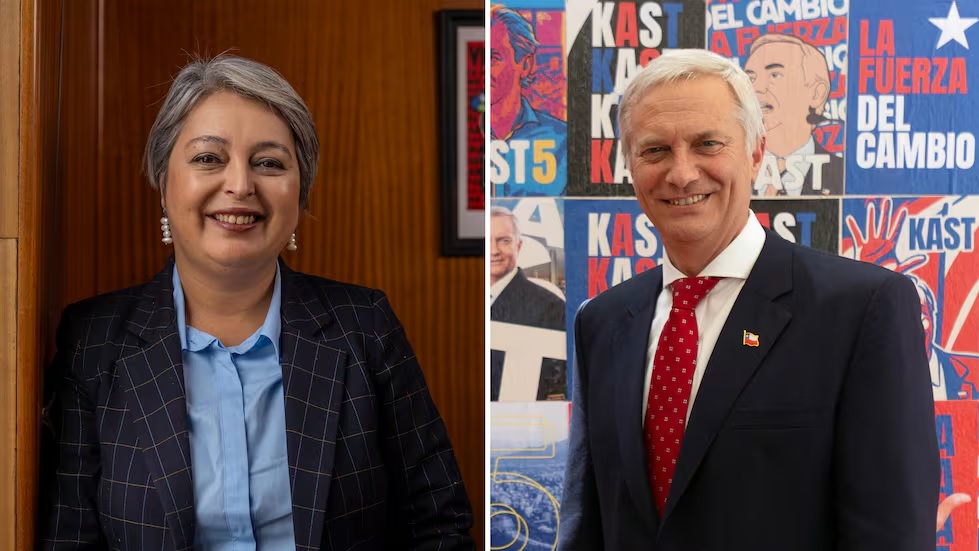
The official candidate Jeannette Jara and the far-right José Antonio Kast will compete for the Presidency of Chile in a second round on December 14, with 70% of the votes counted.
According to the preliminary results of the Electoral Service, Gabriel Boric’s former minister, Jeannette Jara, obtained 26.6% of the votes, while the former far-right deputy obtained 24.3%.
The result is much closer than what the polls predicted before the electoral ban, which gave Jara a victory of over 30%.
The big surprise of the night is the right-wing populist Franco Parisi who, as in the 2021 presidential elections, is in third place, with 19% and considerable progress in the northern regions of the country.
The big losers of the day are the far-right libertarian Johannes Kaiser, whom many polls placed even above Kast, and the representative of the traditional right, Evelyn Matthei, who are practically tied in fourth place with just over 13% of the votes each.
With these results and the dispersion generated, it is necessary to see what the composition of the new Congress looks like, which will be a guideline for the next Government that emerges from the second round.
After knowing the results, Jara said that Chile is a country “with a lot of future and hope” and asked to take care of democracy so as not to put it “at risk” in the face of the second round on December 14, in which, due to the poor performance of the official candidate and according to previous polls, Kast would be declared the winner.
Matthei was the first to come out to recognize the results and, in a brief press conference, said that she would congratulate Kast in person, although she had not yet publicly asked for her support.
Kaiser, on the other hand, was present in the Kast bunker calling for support.
From a public statement at the La Moneda palace, President Gabriel Boric congratulated Jara and Kast and asked them for “a high-minded debate ahead of the runoff, always thinking about what is best for Chile.”
Below we publish the first analysis of our colleagues from La Izquierda Diario Chile.
Low vote for the ruling party, collapse of the center, the right advances in parliament and Parisi surprises with a new populism
Jeannette Jara and José Antonio Kast are contesting the presidency amid the collapse of the center, a low vote for the ruling party and the emergence of forces that express the crisis of representation of the regime. Parisi’s emergence, Kaiser’s vote and the government’s retreat show a scenario marked by polarization towards the right and by social unrest that no traditional force is able to channel.
As a first analysis, we can start with some political definitions. The first thing is that this is, clearly, a hard setback for the ruling party, with a very narrow difference compared to the Republican standard-bearer, Kast. The media themselves are already anticipating that the second round will be uphill for the government, and it is not a minor fact. It shows that the commitment to a “social democratic” program and unity with the old concertationist center was a failure.
In our analyzes we have proposed that in Chile there is an asymmetric polarization, that is, a polarization that moves to the right, within the framework of a broader organic crisis, where institutions, traditional parties and the historical projects of businessmen lose their capacity for direction and consensus. With a second round between a PC militant and a declared Pinochet supporter like Kast, the polarization remains, although attenuated compared to the forecast of some analysts who saw Kaiser as stronger than he really appeared.
Before this Sunday’s elections, different surveys installed the idea of the “Kaiser phenomenon.” And although its final result was 13.87%, what was really new was Franco Parisi’s vote, which reached almost 19% at the national level. With a populist speech, focused on economic measures such as eliminating VAT on medicines and diapers, reducing the salaries of senior public officials, promoting mortgage loans in pesos and allowing self-loaning of pension funds, Parisi managed to connect with a broad sector, reinforced by his well-known phrase “no facho, no comunacho”, establishing himself as a populist from the “center” but as an “outsider.” Parisi combined a left-wing populist discourse on the economy with a right-wing populism on security and migration issues, and apparently managed to capitalize on discontent where the ruling party had no answers.
Another key political definition of this cycle is the collapse of the traditional center, which is expressed both in the election of Evelyn Matthei and, previously, in the candidacy of Carolina Tohá. The old representatives of the establishment are no longer able to convince broad sectors of the population. This disaffection is not an isolated phenomenon: it is part of the crisis of representation that crosses the political system and that, in its most structural dimension, is an expression of that organic crisis where businessmen can no longer articulate a project capable of ordering society as a whole.
However, the polarization is still there. That the Kaiser phenomenon has not expanded as the polls anticipated does not mean that polarization has disappeared. The result of the second round itself confirms it: Jeanette Jara with 26.29% and José Antonio Kast with 24.66%. Furthermore, the Republican Party of José Antonio Kast becomes the leading force in the Chamber of Deputies. Both the UDI and RN decline in deputies and Kaiser’s National Libertarian Party achieves a bench of 7 deputies, while the Communist Party manages to maintain 11 deputies.
Kast, for his part, must look for Kaiser’s base, which is precisely a base from which he has sought to get rid of in order to “moderate” and transform himself into an alternative. He must also seek to dialogue with Matthei’s base, which seems to be much more “center” and “consensus”, versus what José Antonio Kast represents. That is to say, very “radical” for Matthei’s base and very “lukewarm” for Kast’s base.
The triumph of Jeannette Jara over Carolina Tohá in the primaries generated important expectations among the social base of the government, who saw the candidate as more of a leftist path and with greater popular roots. However, his candidacy quickly turned to reaching an agreement with the former Concertación, leaving aside much of his left-wing approaches and turning to openly social-democratic and center-left rhetoric. The social democratic route over the “left-wing populist” option centered on the discourse of “people versus elite” (which is an option that some analysts saw as possible), proved to be a failure.
Gabriel Boric’s government won with the epic of defeating the extreme right and confronting the advance of “fascism.” However, after 4 years it is precisely the right and the extreme right that is becoming stronger. In this way, a debate is required to draw the lessons from this result. From our point of view, it has been demonstrated that it is only possible to confront the advance of the right by promoting organization, coordination and mobilization to achieve the demands that have been resolved.
In a scenario where the right advanced, from the Revolutionary Workers Party of Chile we fought for an independent, anti-capitalist and socialist policy that would have its own voice in these elections. We appeared in places such as Arica, Antofagasta, Valparaíso and in various communes of Santiago, defending this space and in some cases advancing in voting regarding the 2021 parliamentary elections. We put the center on an anti-capitalist program, raising the need to reverse priorities, in the face of the agenda of the big businessmen who imposed the security debate, fiscal adjustment and greater benefits for investors over the rights of the working class, the environment and the communities. Likewise, consider that to confront the right, a left of class independence is required, which promotes the mobilization and independent struggle of the working class and the people.
Source: www.laizquierdadiario.com

